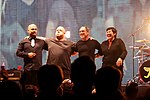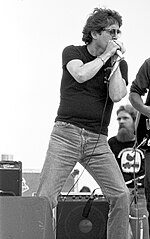Portal:Rock music
The Rock Music Portal
Rock is a broad genre of popular music that originated as "rock and roll" in the United States in the late 1940s and early 1950s, developing into a range of different styles from the mid-1960s, particularly in the United States and the United Kingdom. It has its roots in 1940s and 1950s rock and roll, a style that drew directly from the blues and rhythm and blues genres of African-American music and from country music. Rock also drew strongly from genres such as electric blues and folk, and incorporated influences from jazz and other musical styles. For instrumentation, rock has centered on the electric guitar, usually as part of a rock group with electric bass guitar, drums, and one or more singers. Usually, rock is song-based music with a 4
4 time signature using a verse–chorus form, but the genre has become extremely diverse. Like pop music, lyrics often stress romantic love but also address a wide variety of other themes that are frequently social or political. Rock was the most popular genre of music in the U.S. and much of the Western world from the 1950s to the 2010s.
Rock musicians in the mid-1960s began to advance the album ahead of the single as the dominant form of recorded music expression and consumption, with the Beatles at the forefront of this development. Their contributions lent the genre a cultural legitimacy in the mainstream and initiated a rock-informed album era in the music industry for the next several decades. By the late 1960s "classic rock" period, a number of distinct rock music subgenres had emerged, including hybrids like blues rock, folk rock, country rock, southern rock, raga rock, and jazz rock, which contributed to the development of psychedelic rock, influenced by the countercultural psychedelic and hippie scene. New genres that emerged included progressive rock, which extended artistic elements, and glam rock, which highlighted showmanship and visual style. In the second half of the 1970s, punk rock reacted by producing stripped-down, energetic social and political critiques. Punk was an influence in the 1980s on new wave, post-punk and eventually alternative rock.
From the 1990s, alternative rock began to dominate rock music and break into the mainstream in the form of grunge, Britpop, and indie rock. Further fusion subgenres have since emerged, including pop-punk, electronic rock, rap rock, and rap metal. Some movements were conscious attempts to revisit rock's history, including the garage rock/post-punk revival in the 2000s. Since the 2010s, rock has lost its position as the pre-eminent popular music genre in world culture, but remains commercially successful. The increased influence of hip-hop and electronic dance music can be seen in rock music, notably in the techno-pop scene of the early 2010s and the pop-punk-hip-hop revival of the 2020s. (Full article...)
General images -
Selected article
The Pixies are associated with the 1990s alternative rock boom, and draw on elements including punk rock and surf rock. Their music is known for dynamic "loud-quiet-loud" shifts and song structures. Francis is the Pixies' primary songwriter; his often surreal lyrics cover offbeat subjects such as extraterrestrials, incest, and biblical violence. The band achieved modest popularity in the US but was more successful in Europe. Their jarring pop sound influenced acts such as Nirvana, Radiohead, the Smashing Pumpkins and Weezer. The Pixies' popularity grew in the years after their breakup, leading to a 2004 reunion, sold-out world tours and four further albums: Indie Cindy (2014), Head Carrier (2016), Beneath the Eyrie (2019) and Doggerel (2022). (Full article...)
Selected biography
In 1963, he formed the Paul Butterfield Blues Band, which recorded several successful albums and was popular on the late-1960s concert and festival circuit, with performances at the Fillmore West in San Francisco, the Fillmore East in New York City, the Monterey Pop Festival, and Woodstock. The band was known for combining electric Chicago blues with a rock urgency and for their pioneering jazz fusion performances and recordings. The band was also among the first racially integrated blues groups. After the breakup of the group in 1971, Butterfield continued to tour and record with the band Paul Butterfield's Better Days, with his mentor Muddy Waters, and with members of the roots-rock group the Band. While still recording and performing, Butterfield died in 1987 at age 44 of an accidental drug overdose.
Music critics have acknowledged his development of an original approach that places him among the best-known blues harp players. In 2006, he was inducted into the Blues Hall of Fame. Butterfield and the early members of the Paul Butterfield Blues Band were inducted into the Rock and Roll Hall of Fame in 2015. Both panels noted his harmonica skills and his contributions to bringing blues music to a younger and broader audience. (Full article...)
Selected album
Bat Out of Hell II: Back into Hell is the sixth studio album by American rock singer Meat Loaf and the second one in the Bat Out of Hell trilogy, which was written and produced by Jim Steinman. It was released on September 14, 1993, sixteen years after Meat Loaf's first solo album Bat Out of Hell. The album reached number 1 in the United States, United Kingdom and Canada. Five tracks were released as singles, including "I'd Do Anything for Love (But I Won't Do That)", which reached number 1 in 28 countries.
The album was released by Virgin Records outside of North America, where it was released by MCA. The third part of the Bat trilogy, Bat Out of Hell III: The Monster Is Loose, was released in 2006.
Like the first album of the trilogy, Bat Out of Hell II was a commercial success. It sold over 14 million copies worldwide. (Full article...)
Selected song
"Beck's Bolero" is a rock instrumental recorded by English guitarist Jeff Beck in 1966. It is Beck's first solo recording and has been described as "one of the great rock instrumentals, epic in scope, harmonically and rhythmically ambitious yet infused with primal energy". "Beck's Bolero" features a prominent melody with multiple guitar parts propelled by a rhythm inspired by Ravel's Boléro.
The recording session brought together a group of musicians, including Jimmy Page, Keith Moon, John Paul Jones, and Nicky Hopkins, who later agreed that the line up was a first attempt at what became Led Zeppelin. However, there is an ongoing disagreement over the composer as well as producer credits. Despite being credited solely to Page, Beck claims that he made significant contributions to the composition. Likewise, Page and Simon Napier-Bell each claim to have produced it, while Mickie Most received the credit.
"Beck's Bolero" was not released until ten months after recording and then only as the B-side to Beck's first single. When it finally received greater exposure on Beck's debut album Truth in the latter part of 1968, it was still considered quite advanced even though it was over two years old. Beck continued to perform it throughout his career and several renditions have been recorded by other musicians. (Full article...)
Selected picture
Did you know (auto-generated)

- ... that Desulfovibrio vulgaris can remove toxic heavy metals from the environment?
- ... that the heavy metal musician Leah has sometimes been called "the metal Enya"?
- ... that the heavy metal band Cradle of Filth released a T-shirt that was so offensive that several people were arrested for wearing it?
- ... that during his tenure as Governor of Central Java, Muhammad Ismail banned rock music concerts and car rallies?
- ... that the Liverpool Echo described British rock and roll star Tommy Steele as "quite unable to sing and play the guitar at the same time" when reviewing his first album?
- ... that Shin Hae-chul, who previously made hard rock and heavy metal albums, was inspired by big band music when he made The Songs for the One?
Selected genre
Post-Britpop is an alternative rock subgenre and is the period in the late 1990s and early 2000s, following Britpop, when the media were identifying a "new generation" or "second wave" of guitar bands influenced by acts like Oasis and Blur, but with less overt British concerns in their lyrics and making more use of American rock and indie influences, as well as experimental music. Bands in the post-Britpop era that had been established acts, but gained greater prominence after the decline of Britpop, such as Radiohead and the Verve, and new acts such as Travis, Keane, Snow Patrol, Stereophonics, Feeder, and particularly Coldplay, achieved much wider international success than most of the Britpop groups that had preceded them, and were some of the most commercially successful acts of the late 1990s and early 2000s. (Full article...)
Selected audio
Related portals
WikiProjects
Things you can do
Expand: College rock, Electronic rock, Pop rock
Clean Up: Instrumental rock, Rap rock, New wave, Industrial rock, Progressive metal, Southern rock, Folk rock, Funk rock, Space rock
Add Sources: Pagan rock
Join one of the many WikiProjects pertaining to Rock music.
News
No recent news
More articles -
Wish You Were Here is the ninth studio album by the English rock band Pink Floyd, released on 12 September 1975 through Harvest Records in the UK and Columbia Records in the US, their first for the label. Based on material Pink Floyd composed while performing in Europe, Wish You Were Here was recorded over numerous sessions throughout 1975 at EMI Studios in London.
The lyrics express alienation and criticism of the music business. The bulk of the album is taken up by "Shine On You Crazy Diamond", a nine-part tribute to the Pink Floyd co-founder Syd Barrett, who had left seven years earlier due to his deteriorating mental health. Barrett coincidentally visited during the recording. As with their previous release, The Dark Side of the Moon (1973), Pink Floyd employed studio effects and synthesisers. Guest singers included Roy Harper, who provided the lead vocals on "Have a Cigar", and Venetta Fields, who added backing vocals to "Shine On You Crazy Diamond". To promote the album, Pink Floyd released the double A-side single "Have a Cigar" / "Welcome to the Machine". (Full article...)More did you know...
- ... that David Bowie's first gig as lead singer was at the Green Man, Blackheath?
- ... that Carlton le Willows Academy alumni include cricketer Mark Footitt, Air Supply singer/guitarist Graham Russell, and balloonist Janet Folkes?
- ... that the video for Marilyn Manson's soft-rock ballad "Running to the Edge of the World" was widely condemned for its depiction of violence against women?
- ... that Susan Beschta was a punk rocker and federal judge?

- ... that the FM Non-Duplication Rule adopted by the FCC 59 years ago led to the creation of the album-oriented and classic rock radio formats?
- ... that The Elvis Dead, a retelling of Evil Dead II in the style of Elvis Presley, features songs such as "Standing in a State of Shock", "I've Been Possessed", and "Wrapped Up in Vines"?
Major topics
Subcategories
Associated Wikimedia
The following Wikimedia Foundation sister projects provide more on this subject:
-
Commons
Free media repository -
Wikibooks
Free textbooks and manuals -
Wikidata
Free knowledge base -
Wikinews
Free-content news -
Wikiquote
Collection of quotations -
Wikisource
Free-content library -
Wikiversity
Free learning tools -
Wikivoyage
Free travel guide -
Wiktionary
Dictionary and thesaurus















































